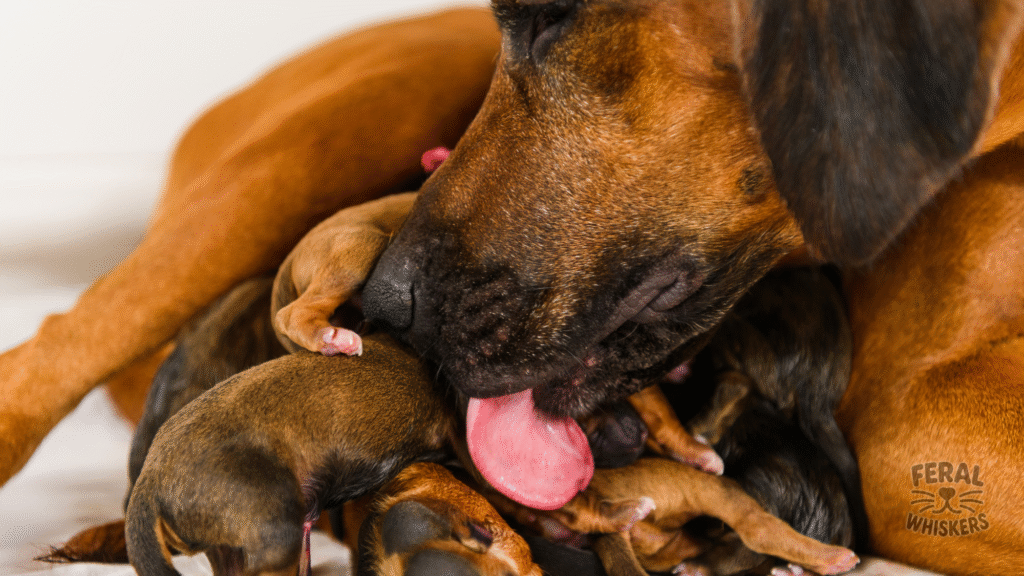Why Brucellosis Matters

Brucellosis is a bacterial disease caused by Brucella canis. It affects the reproductive system, leading to infertility, miscarriages, and stillbirths. It can also spread to the bones, joints, and sometimes the eyes.
⚠️ Human Connection: Brucellosis is zoonotic (can spread from dogs to humans through reproductive fluids), making it a dog health and public health concern.
How Dogs Get Brucellosis
- Mating — the number one transmission route.
- Reproductive fluids (semen, vaginal discharge, placental tissue).
- Urine or saliva (less common, but possible).
- Crowded breeding kennels without testing hygiene protocols.
Common Symptoms in Dogs
- Repeated miscarriages in females.
- Infertility in males and females.
- Swollen testicles (orchitis) or shrunken testicles after inflammation.
- Vaginal discharge (green or yellow).
- Enlarged lymph nodes under the jaw or groin.
- Back pain, stiffness, or lameness in chronic cases.
- Red, inflamed eyes in some dogs (uveitis).
When to See a Vet 🩺
Take your dog to the vet if:
- Your breeding dog can’t conceive or has multiple miscarriages.
- A male shows swollen or shrunken testicles.
- Any dog in your kennel has back pain, swollen lymph nodes, or chronic lameness.
- You operate a kennel or breeding program — routine health screening is crucial.
Diagnosis & Conventional Treatment
Diagnosis:
- Blood tests (RSAT, AGID, ELISA) screen for infection.
- Culture or PCR confirm results.
Treatment:
- Long-term antibiotics (doxycycline + minocycline, sometimes with rifampin).
- Pain relief for chronic back or joint issues.
- Spaying/neutering is essential to prevent spread.
⚠️ Brucellosis is often lifelong — antibiotics reduce symptoms but may not fully clear infection.
Vaccination:
❌ Currently, no licensed brucellosis vaccine exists for dogs. Prevention relies on testing, hygiene, and neutering.
Holistic Support & Prevention 🌿
While holistic methods cannot cure brucellosis (since it is systemic bacterial), they can support the immune system, reduce inflammation, and improve life quality in affected dogs.
🥣 Diet Support
Boosting your dog’s immune system with a clean, anti‑inflammatory diet helps manage symptoms:
- Lean proteins — chicken, turkey, or fish for muscle support.
- Anti-inflammatory foods — pumpkin, blueberries, spinach, turmeric (natural immune booster).
- Probiotic-rich additions — plain unsweetened yogurt or kefir to balance gut bacteria during/after antibiotics.
- Bone broth — supports joint, gut, and immune health.
👉 Simple Immune-Boosting Meal Recipe (vet-approved, homemade support):
- 1 cup boiled chicken breast (shredded)
- ½ cup pumpkin puree (fiber + gut health)
- ¼ cup cooked spinach or kale (antioxidants)
- ½ tsp turmeric + tiny pinch of black pepper (boost absorption, anti-inflammatory)
- 1–2 tbsp bone broth
Serve warm over your dog’s regular food or as a supportive meal 2–3x a week.
(Note: This is a supplement recipe, not a full long-term diet. Always check with your vet for nutrition balance.)
🌿 Holistic Remedies & Lifestyle
- Immune herbs
- Echinacea – boosts defenses.
- Astragalus root – supports immune resilience.
- Olive leaf extract – natural antibacterial support.
- Joint & Pain Support
- Glucosamine + Chondroitin to support joints if infection affects bones/spine.
- Omega-3 fatty acids (fish oil) – reduce inflammation, especially for arthritis signs.
- Environment
- Practice strict kennel hygiene (disinfect whelping areas, bedding, and bowls).
- Do routine brucellosis testing before breeding.
- Spay/neuter non-breeding pets to eliminate transmission risk.
Expectations Long-Term
- Infected breeding dogs must be removed from breeding programs permanently.
- With good management, spayed/neutered pets can live normal lives as companions.
- Lifelong supportive care may be needed if spine or joints are impacted.
- Humans should use gloves when handling discharge from infected animals.
Human Safety
Though uncommon, Brucella canis can infect people, especially breeders, vets, or anyone exposed to reproductive fluids.
Safety tips:
- Always wear gloves when cleaning up after dogs with reproductive issues.
- Disinfect areas with diluted bleach (1:10).
- If you develop unexplained fever or chronic fatigue after exposure, seek medical testing.
Final Takeaway
Brucellosis in dogs is a serious reproductive infection with no vaccine and no guaranteed cure. Conventional antibiotics plus neutering are the foundation of treatment, but holistic care (immune nutrition, herbs, and anti-inflammatory diet support) can help infected dogs live healthier, more comfortable lives.
For pet parents with spayed/neutered dogs — the everyday risk is very low. For kennels and breeders, strict testing and hygiene are the key to prevention.

